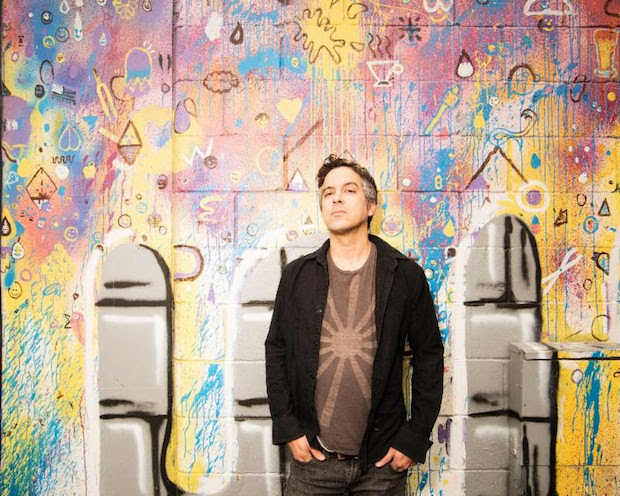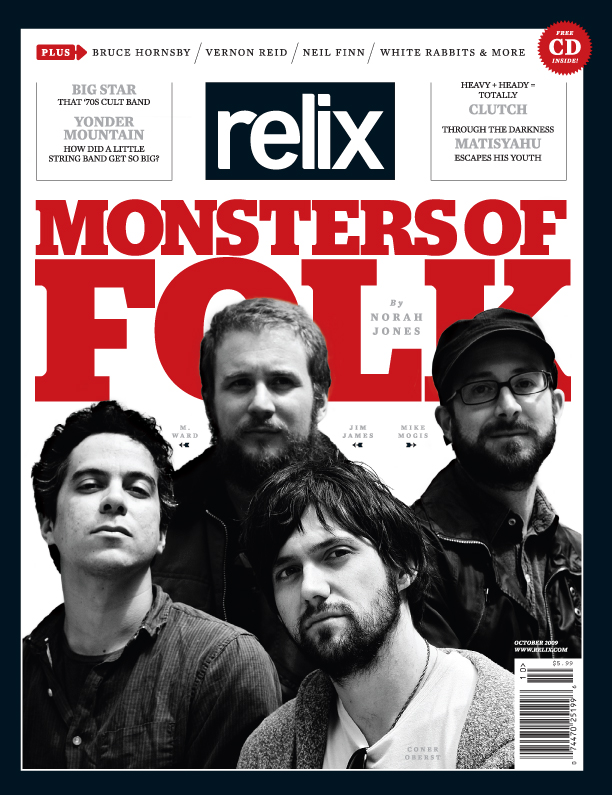M. Ward: Happy When it Rains
 Matthew Ward, better known by his abbreviated forename “M.,” isn’t used to this weather. It’s an unseasonably warm December day in New York City, and the small ice skating rink outside his swanky Manhattan hotel is slowly turning into more of a very cold wading pool. Ward steps out from under the café’s speaker for a more secluded corner where someone delivers a platter of assorted snacks. Congenially, and with the unmistakable air of ease that is so evident in both his music and his presence, Ward offers to share some of “whatever he just put down.”
Matthew Ward, better known by his abbreviated forename “M.,” isn’t used to this weather. It’s an unseasonably warm December day in New York City, and the small ice skating rink outside his swanky Manhattan hotel is slowly turning into more of a very cold wading pool. Ward steps out from under the café’s speaker for a more secluded corner where someone delivers a platter of assorted snacks. Congenially, and with the unmistakable air of ease that is so evident in both his music and his presence, Ward offers to share some of “whatever he just put down.”
The weather that Ward is accustomed to may not be everyone’s cup of tea, but it suits him just fine. For the last decade and a half, Ward has spent most of his time in Portland, Ore., and has long since learned to embrace the constant drizzle. As he freely admits, in the Northwest, rainy days aren’t just an inconvenience—they’re a way of life.
“Living in a place that has three seasons of rain is a challenge,” Ward says. “But it’s not without its solutions. It’s the perfect environment for making music and recording.”
Ward’s newest album, which came out in early March, is a tribute to those wet months. More Rain begins with the title track, which features an ambient drone and lightly whistling wind, giving the impression that the listener is peering into the mouth of a gaping cave, an almost ominous feeling that gives way to the more comforting soundtrack of soft rain and what sounds like gently tinkling wind bells. This isn’t the sound of a looming storm; this is the soothing consistency of a gray sky that makes it acceptable to stay inside and listen to an album like More Rain, taking it easy by a radiating heater like the one pictured on its cover.
“It seemed like a good backdrop for the record because it’s a very true backdrop for all of the recording and all of the writing,” Ward explains, referring to his Portland surroundings. “Every record I have, the ideal is to be able to look back on them and know that I came close to capturing where I was at that time.”
If he accomplishes his goal, then each album is a captured image of where he was both physically and mentally—another entry in an ongoing diary or scrapbook that Ward views as “almost like a photograph or a little movie.”
But he didn’t necessarily write all of these songs recently. While he penned some of them in the interim since his last solo effort, 2012’s A Wasteland Companion, Ward claims that half of the tunes are 10– 20 years old. “I’m always rewriting old songs that I’ve never felt were finished,” he explains. “Every record I’ve made has a combination of old and new. I never really wanted to make a record where it’s just the songs that I wrote over the last couple of weeks or months or something. It just doesn’t sound very interesting to me.”
It’s one of the signifiers that you’re listening to an M. Ward track. Besides his instantly recognizable breathy vocal delivery, Ward’s music has a timeless quality that always seems to combine nostalgia and innovation, a tribute to the experienced producer’s meticulous work in the studio and his willingness to incorporate old tunes. “I can just help myself,” Ward admits, “from [picking back up] whatever I’ve put down.”
In fact, the plan that Ward originally had for this album—for it to be a DIY doo-wop record with his own voice layered again and again on top of itself—would have made it his most innovatively nostalgic effort to date. The resulting influence that idea had on these tracks may have accomplished that feat anyway. “There’s definitely new experiments for me [on this album],” he says. “This one has the most vocal layering, and I tried to make some more challenging arrangements. That’s how the record started.”
As to why an experimental, doo-wop-inspired album appealed to him, Ward offers an explanation that seems to pretty much sum up his ethos and reflect how his career has panned out thus far: “It sounded like fun to me,” he says. “So that’s what I did.”
As with most projects, More Rain did not end up being the record that Ward had envisioned at the outset, but the influence is apparent on tracks like “Time Won’t Wait,” whose verses feature an underlying percussive vocal line from Ward. The song also employs Neko Case— who appeared on Ward’s 2006 album Post-War—for tight harmonies in the chorus, a subtle-but-memorable cameo in an album chock full of them. k.d. lang accompanies Ward on the closest thing to a straight-up doo-wop tune on the album, “Little Baby”—a lilting ode to the innocence of youth. Ward says that he met lang, who is also currently based in Portland, through a mutual friend, director Gus Van Sant.
“I’ve been a fan of her voice for a very long time, but we’ve never worked together until [now],” Ward says. Having lang help out on the song allowed him to dig deeper into the doo-wop realm, drawing on her vocal knowledge and experience to recreate the classic genre in his own established style. “She’s just an incredible mind—an incredible voice—when it comes to all things music. She’s a vocal genius. She brought in some really amazing layers that only she can do. It was a pleasure to work with her.”
Since he brought in singers of Case and lang’s caliber, it might seem a bit odd that Ward relegated them to backing vocals but, in reality, those two songs wouldn’t be the same without those specific voices. “You can’t imitate what great singers bring to a song,” Ward says. Case and lang’s contributions make for some of the best musical textures on the album, which is the result of experienced voices knowing when to shine and when to mix discreetly with Ward’s.
After all, it is Ward’s name on the cover— although to call More Rain a record by “M. Ward & Friends” wouldn’t be totally out of line. Besides Case and lang, the album features several guest instrumentalists, including R.E.M. guitarist Peter Buck and bassist Joey Spampinato of NRBQ, which Ward calls one of his “all-time favorite bands.”
Although he has worked with Spampinato in the past, this was Ward’s first experience in the studio with Buck, for whom his admiration is evident. “He needs no introduction—he’s Peter Buck,” Ward says. “He’s written some of the greatest songs ever. He’s just a great guitar player.” Whether it’s his signature Rickenbacker in the midst of the guitar-heavy “Temptation” or a few plucks of his mandolin on “Phenomenon,” Buck’s contributions to More Rain are, as with all the other guests, understated yet vital. “He knows how to make simple sound really good,” Ward says. “Those are my favorite guitar players.” 
Ward has never shied away from working with a diverse mix of artists and, in fact, some of his most high-profile records have been true collaborations. After establishing himself with five solo studio records in the early aughts, Ward teamed up with actress Zooey Deschanel to form She & Him, releasing their debut album in 2008. The following year, Monsters of Folk, an indie supergroup made up of Ward, My Morning Jacket’s Jim James and Bright Eyes’ Conor Oberst and Mike Mogis, dropped their first and only record to date.
When asked how a musical friendship turns into a full-fledged collaboration, Ward speaks to the organic nature of the experience. “It normally starts off as a mutual love for the same things,” he says. “It starts out with baby steps of specific songs, one song at a time. Then, when you have a couple of songs, you immediately start thinking, ‘Hey, we can make a record.’” Of course, it helps to have the right people around. “I consider myself very lucky to have found quite a lot of people—engineers and artists—that I truly love working with.” He describes a good collaboration as being like a good dialogue, “where there’s a back and forth that’s almost equal,” with each party listening to and trusting in one another.
Ward’s collaborations aren’t limited to performing. Over the span of his career, he has handled production duties for— along with his own projects—artists like Jenny Lewis, Carlos Forster and, most recently, Mavis Staples. (Her Wardproduced album Livin’ on a High Note was released in February.)
“She’s an amazing singer,” Ward says of Staples. “I love working with her band, and we ended up getting songs from a couple dozen different songwriters for this project.” That all-star cast of writers includes, among others, Bon Iver’s Justin Vernon, Nick Cave, Ben Harper and Aloe Blacc, along with Case and Ward himself. “It was really unique,” he says. “I’m excited for people to hear that record.”
As his list of musical friends expands, Ward plans to remain busy on both sides of the recording console, especially on his own projects, whose production he has no immediate plans to hand over to another person. “Part of the joy of making records is producing,” he says. “I’m not against it—someday, maybe—but there’s just no need to delegate something that you love to do.”
He does admit, however, that it can be difficult to gain a wider view on his own work and look at it from a producer’s standpoint. “It’s not better or worse, it’s just different,” he says. “It’s much harder because I’ve been working on the composition for, sometimes, years. I’m inside of the perspective, and I’m not really outside of it until some time goes by and I start studying them with friends and journalists, and then I learn things about them.”
When listening to Ward’s soothing intonations as he talks about how his career has come together, it’s easy to forget how much work he has put into his and others’ music over the years. His explanations almost make it seem like it all came easily—that he was just sitting inside one rainy day and the guitarist from R.E.M. happened to saunter up and offer to play on his album. But, in reality, it’s more that his go-with-the-flow, do-what-you-love mentality has gotten him this far.
“The only way I know how to work is song by song, which means just diving in headfirst,” Ward says. “It’s really just following your nose to the next step.” Luckily for him, his sense of smell is top-notch.
More Rain begins with a rainstorm and ends with sunshine, at least in musical form. Closing track “I’m Going Higher” is a ray of light, a forward-looking shout of exultation in the midst of the gathering storm, with a buoyant choir of voices (including help from The Secret Sisters) and a defiant refrain: “I’m going higher some day/ Although it might not look that way.”
In a place where rainy days are the norm, he thrives by accepting the inevitable and always looking for the next project that he will immerse himself in with an open mind. “With every song, I try to say something different because I will get bored quickly if I’m just retracing my steps,” Ward says. “The most important thing is to keep pushing the ball forward.”



















